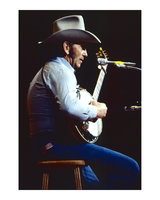
Banjo player Elmer Bird was recognized as one of the country’s finest old-time musicians. He was born on May 28, 1920, in a part of Putnam County that remains rural to this day — one of Andrew Jackson Bird and Lottie Johnson Bird’s 11 children. Elmer taught himself to play banjo by watching his father strum each evening after working the corn, wheat, and tobacco crops all day. He once asked his father if he was too tired to play. Andrew replied, “Yeah, but it relaxes me.”
By studying his father’s technique, Elmer honed the drop-thumb clawhammer style, which strikes down on the strings with the thumb and first or second finger — shaped like a claw —and then pulls up on the fifth string with the thumb while grazing the second string. Most other traditional players at the time used a simpler two-finger style. But he spent more time helping his father on the farm than he did practicing music. In addition to tending the fields, Bird worked with the cattle and hired himself out to neighbors sawing logs.
Radio, then in its early days, was an escape for him, especially the Grand Ole Opry and The Old Farm Hour on Charleston’s WCHS. As a teenager, Elmer and his cousin George, a fiddler, performed for Future Farmers of America events and on WCHS and WSAZ radio. About 1939, the two decided to hitchhike to Nashville but never made it past Ashland, Kentucky, where they auditioned for Asa Martin, a local entrepreneur who was trying to build his own version of the Grand Ole Opry in eastern Kentucky. As George and Elmer (sometimes called the Bird Brothers), they performed twice daily on Martin’s The Morning Roundup on Ashland’s WCMI radio.
After about six months as professional musicians, Elmer and George returned home. Soon, the nation entered World War II. Elmer was drafted into the army and served in the North Africa and Sicily campaigns. In 1944, he received word that George had been killed during the Normandy Invasion. Bird returned home after the war and married Beulah Edwards on December 4, 1945. They built a house and farm on Turkey Creek and had three children. To support the family, he first drove a truck and then went to work at Union Carbide’s South Charleston plant in 1954.
That year, Eck Gibson and the Mountaineer Ramblers, a local bluegrass band, hired Bird. To that point, Bird had never played bluegrass banjo, a relatively new three-finger style made famous by Earl Scruggs. The band gave him a set of finger picks, and he figured out his own three-finger picking method. The band initially played a 15-minute show on weekdays and a 30-minute Saturday show on Huntington’s WHTN radio. He performed with that band for the next 15 years despite, as he would openly admit, never becoming an authentic bluegrass banjo player. Whenever someone challenged him about it, he had a ready response, “I’m not trying to be. I’m just filling in ‘til they get somebody!”
In 1972, he retired from Union Carbide to pursue a solo music career. Feeling somewhat rejected by the bluegrass community, he turned back to old-time music, except he sped up the tunes with what he called a “double drop-thumb” style. While focusing primarily on traditional music, he often mixed bluegrass and country numbers into his repertoire. About this time, he was playing a show with David Morris, who could not remember Bird’s name. So, Morris dubbed him “The Banjo Man from Turkey Creek.” It stuck.
In 1975, Bird had a chance encounter that changed his life: meeting Grammy Award winner John Hartford at the Skyline Bluegrass Music Festival in Ronceverte. Hartford gave him some advice that boosted his confidence, “You just play that banjo like you’re capable of playing it. Let [the audience] make up their mind what they think of it.”
Bird began recording his own albums, starting with Elmer’s Greatest Licks (1979) and Home Sweet Home (1982). Hartford produced and played fiddle on Bird’s next three: Bumble Bee Waltz (1985), Turkey Creek (1987), and George How I Miss You (1992) — a tribute to his late cousin. Meanwhile, Bird became a regular at the state Folk Festival, Mountain State Art & Craft Fair, Jamboree USA, Vandalia Gathering, and Appalachian String Band Music Festival, often winning the banjo contests (including six blue ribbons at Vandalia). The Society for the Preservation of Bluegrass Music in America named him the country’s best old-time banjo player in 1984, 1985, 1986, and 1990. During this time, he toured throughout the United States and Canada and appeared on the Mountain Stage radio show.
In 1996, he received the Vandalia Award, West Virginia’s highest folklife honor. He died at his home near Hurricane on July 29, 1997. As mourners filed out of his funeral at a Putnam County church, they were greeted by John Hartford and his banjo, solemnly playing one final tune for “The Banjo Man from Turkey Creek.”
Last Revised on April 19, 2023
Sources
Tribe, Ivan M. Mountaineer Jamboree: Country Music in West Virginia. Lexington: University Press of Kentucky, 1984.
Gartner, Paul. Elmer Bird: The Banjo Man from Turkey Creek. Goldenseal, 23, 2, Summer 1997.
Cite This Article
e-WV: The West Virginia Encyclopedia "Elmer Bird." e-WV: The West Virginia Encyclopedia. 19 April 2023. Web. 23 April 2024.


Comments?
There aren't any comments for this article yet.
Click here to read and contribute to the discussion →